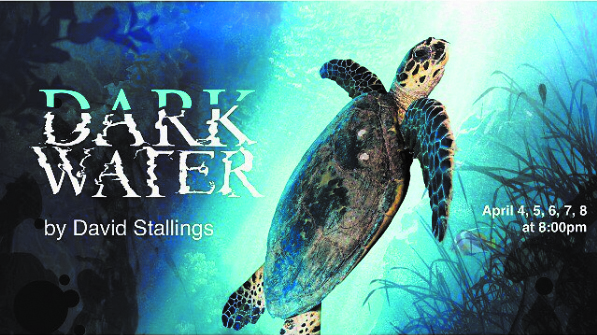Set in Louisiana during the Deepwater Horizon oil spill of 2010, David Stalling’s “Dark Water” raises questions touching on political regulations, religion, and environmental responsibility. The play ran for five nights in the Edson R. Miles Black Box Theater of Griffiths Hall, and featured Mikayla Mclean ’20 as the turtle Barnacle, Henry Liebers ’19 as the seagull Gullet, Hamidou Sylla ’21 as the turtle Weed, and Isabelle Murray ’21 as Daedalus the dolphin.
The play begins with a focus on the seagull Gullet, bloated from the killing of helpless animals, who tells the audience that the oil spill will be yet another opportunity for him to get fat on the misfortunes of others. He spies from above as the turtle Weed tells his mother Barnacle that the rest of her children are trapped by the spreading oil approaching them. Soon all three of them begin a journey prompted by the threat of the dark water but each for very different reasons.
The characters in the play represent different groups of people in real life and their reactions to events such as the Deepwater Horizon oil spill. “Dark Water” draws you into the desperation and pain of a family in trauma, stuns you with the ruthlessness of the wealthy, and warms you with the anticipation of change. Though animals, Stalling’s characters live and die with the same hope and pain as human beings.
For Jalissa Perez ’18, the play is also bittersweet as it is her final performance as a Saint Lawrence student. Perez played Foam, an orphaned turtle who breaks out of her comfort zone to care for other animals affected by the oil spill. “While I’m sad that this is my last show here on campus, I am grateful for the opportunity to work with such a wonderful cast and crew,” she says.
What we don’t see is how much work the cast and crew invest in the weeks before and during the week of the production itself. The hair and makeup department could expect to spend around five-and-a–half hours working each of the five nights, supervisor Marisol Ramirez explains. “Show week is always the busiest for the crew,” she says. “It’s really rewarding to see everyone’s hard work pay off in the end.”
The hope of the cast and crew is that the message of the play was heard and absorbed by the audience. “David Stallings did a wonderful job in capturing the danger of what oil spills and other kinds of pollution are doing to our oceans, as well as providing a storyline that helps the audience realize the urgency of the issues plaguing our society today,” Perez says. What Stallings shows us are the consequences humanity will face if we fail to learn from events such as Deepwater Horizon.
The same weekend as the play, the dark water appeared again, this time around the Indonesian Island of Borneo. An oil spill caused by the breakage of an underwater pipeline is threatening both the human and animal population in the area. The oil has spread to cover approximately 50 square miles and resulted in five human fatalities, according to The Guardian. The slick devastated local marine animals and caused health concerns for the 700,000 occupants of the region. The fact that these events continue to occur illustrates the need for the message of “Dark Water” to be heard.



